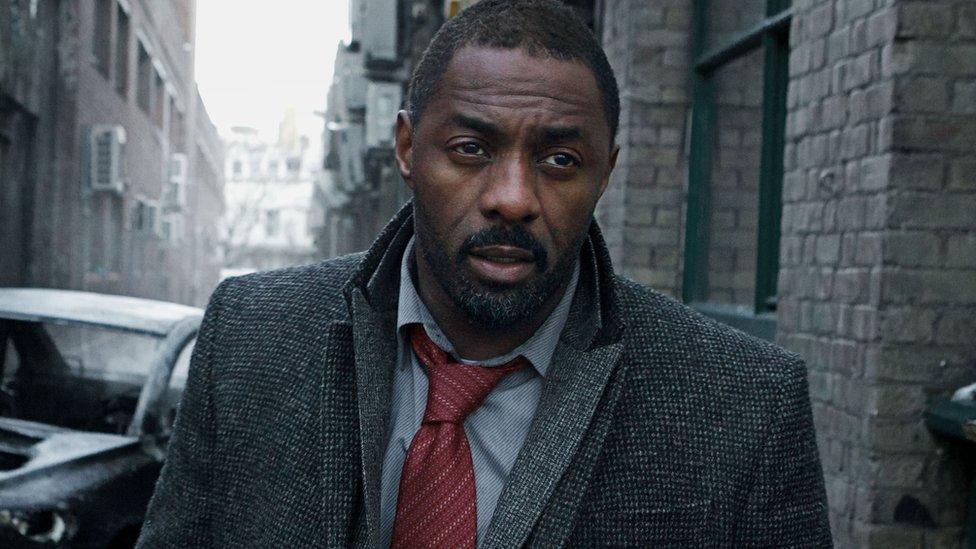Idris Elba takes on Beastly African warfare role
- Published
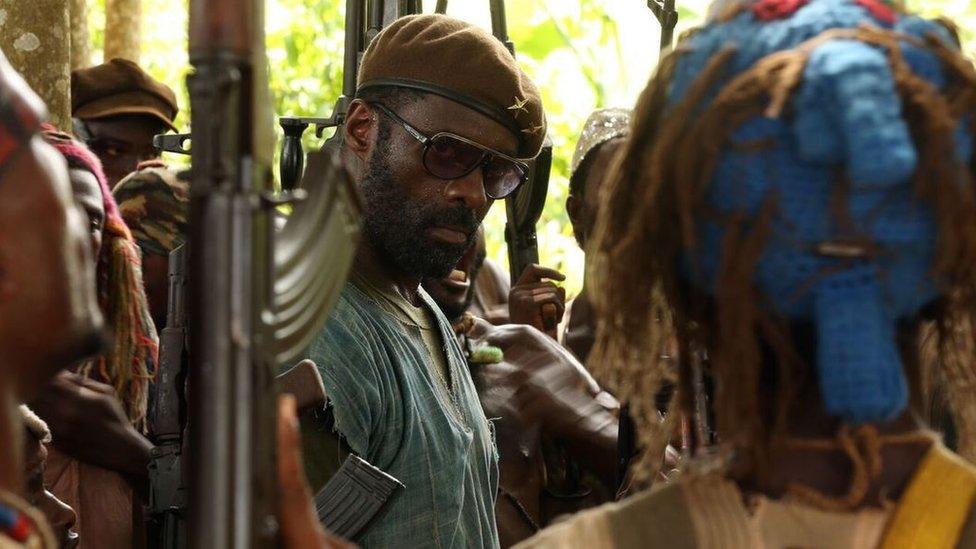
Idris Elba says he studied ruthless dictators such as Hitler for the role of Commandant in Beasts of No Nation
Already famous for his roles as Stringer Bell and DI John Luther in the TV shows The Wire and Luther, London-born Idris Elba is being tipped not only as the next Bond, but for an Oscar nomination for his new film, Beasts of No Nation.
It's made by Cary Fukunaga, director of the acclaimed True Detective TV series and is a harrowing exploration of child soldiering in West Africa. Elba plays the charismatic but ruthless Commandant, who keeps his young recruits in his thrall with an eerie contradiction of intimidation and paternal care
Describing it as "one of the greatest parts I've ever been offered", the actor calls the Commandant "very attractive because he is so multi-layered. It gave me an opportunity to study the mechanics of leadership and charisma.
"I had to study dictators such as Hitler for this. The Commandant sees himself as destined for greater things than just his small army and the small piece of territory it occupies.
"He's definitely not a one-dimensional villain. He really loves being idolised and he's highly regimented. He can be jovial and then he just descends into darkness. Really, he was wonderfully complicated."
Beasts of No Nation is based on a 2005 novel by Nigerian author Uzodinma Iweala, which follows the story of Agu, a young boy from a fictional West African country who loses his family when civil war breaks out.
Fleeing into the jungle, he is recruited by Elba's character and is brutally initiated into his band of soldiers, who are predominantly children. Elba was already a fan of the book, and had read it partly to research his own West African heritage.

Abraham Attah who plays Abu was discovered by director Cary Fukanaga at a football match in Ghana
"I'd love for film audiences to gain what the book gives you - a deeper understanding of how child soldiers have come to be a resource for armies across the world," he says.
"This was also a rare chance to explore my roots in a film - we shot on the coast in Ghana, where my mum comes from. Obviously because my dad comes from Sierra Leone, child-soldiering is an issue that I've wanted to familiarise myself with."
The UN estimates there are anywhere between 300,000 and 500,000 child soldiers serving in the world - mainly in Afghanistan, the Central African Republic, Chad, the Democratic Republic of Congo, Mali, India, Pakistan, Syria, Yemen and Sudan. While children are often as young as six, the average age is 14. Often, they are used for front-line fighting as well as carrying and loading ammunition.
Elba describes Beasts of No Nation as a platform to show "the emotional underbelly of child soldiering. We may know they exist but we've never fully appreciated why, and what the relationship is between them and their leaders.
"The Commandant behaves with purpose to numb these children, to disrupt their social structure and then tell them they can fight back. I'm told terrorist organisations like Boko Haram do exactly the same thing."
Fukunaga discovered the boy who would play Agu, 14-year-old Abraham Attah, at a football match in Ghana. Fukunaga's original plan was to cast only non-actors in the film and he feared Elba was "too famous" to want the role.
But he describes Elba as a "force of nature" and asked him to display some of the Commandant's qualities with the young boys on set.
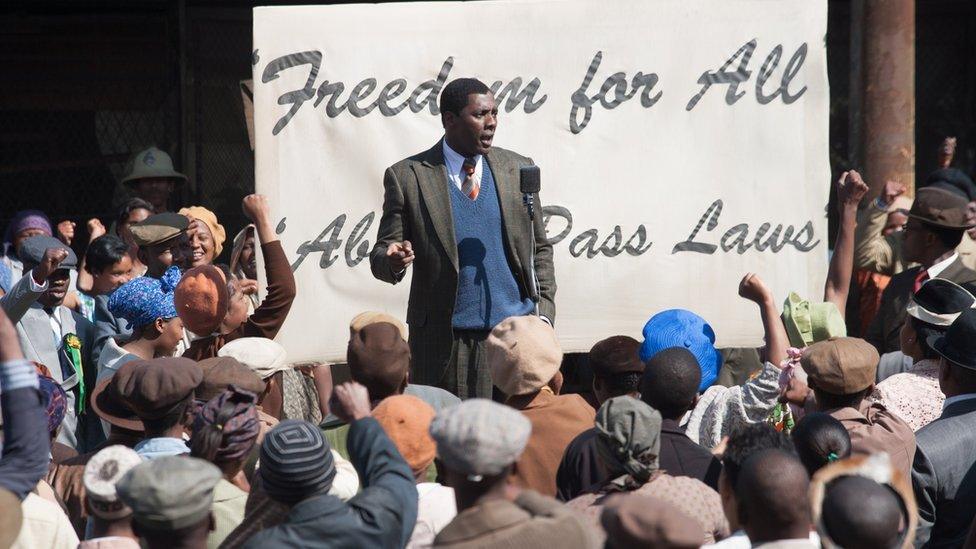
Idris Elba as Nelson Mandela in Mandela: Long Walk to Freedom
"They wanted me to take on this alpha-male-like stance even when the cameras weren't turning - and I needed to," says Elba.
"When I first got there, some of the kids would stand right in front of me, just staring me out. These are tough street kids we're talking about, kids who've grown up in refugee camps and there were a few former child soldiers cast too.
"Had I shown the slightest bit of weakness, that would have been it - we wouldn't have been able to make the film. I couldn't blink first. I had to adopt the attitude of 'What are you looking at?' and then they'd back off.
"In real life Abraham is like my own son - off-set we'd play football - but as soon as we were on set, there would be this antagonistic, dysfunctional father-son relationship."
Elba points out that it was Abraham Attah who won the Best Actor prize at the Venice International Film Festival, and describes himself as "a real proud dad about it", but much of the critical praise for the film has been heaped on the older actor's shoulders.
He - and the movie - are now regarded as front-runners for awards season, but Elba, who missed out on a nomination for playing Nelson Mandela two years ago in Mandela: Long Walk to Freedom, is refusing to be drawn on it.
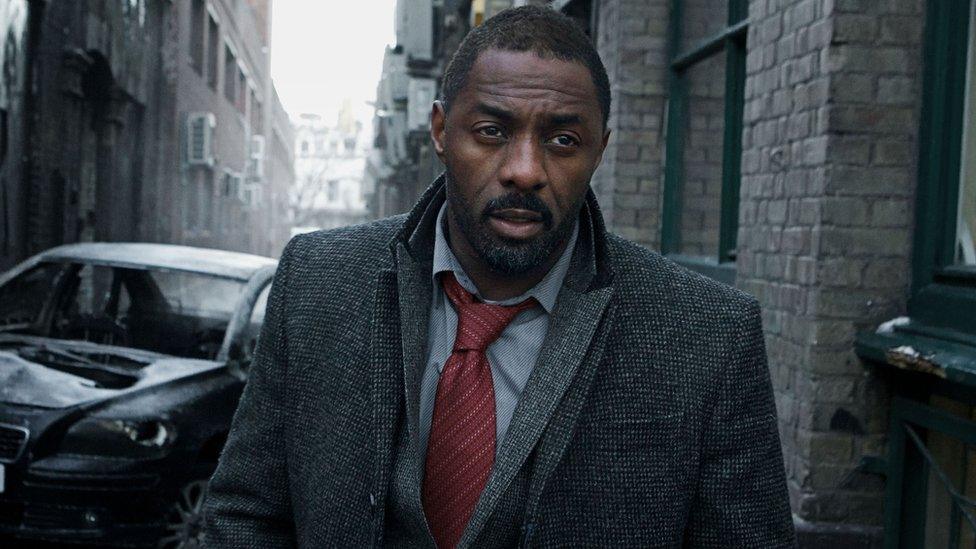
Idris Elba is returning as Luther in two special episodes of the hit BBC One detective series
"When you make an independent film like this it's a real struggle to get anyone to see it at all. And this is a truly independent film. You're just lucky if anyone gets to see it. So if we are being applauded, it means people will see it, and I am proud for everyone."
Swelling the audience, Elba believes, is the fact that this is video-streaming site Netflix's first foray into film-making. "The model isn't proven yet but there's a possibility of getting up to 68 million people watching in a day.
"Let's be honest, a film like this would never get that many people to see it, ever, so I think it has massive potential for the film industry."
Earlier this year, Elba seemed to rule himself out of reports that he could be cast as the new James Bond, telling the British Film Institute: "If there was ever any chance of getting it, it's long gone - the rumour got so big it seems to have eaten itself".
More immediately, he's returning to the BBC as DCI John Luther for two special episodes.
"Die-hard fans still expect to meet me wearing Luther's overcoat and are so disappointed when I'm not.
"I'm really grateful there are a few parts I've done that audiences seem to appreciate, but there's one thing that Beasts has given me and that's the desire to direct. I watched Cary doing it; he's given me a few tips and tricks - I've really learned from him. I hope that's going to be on the cards for me in the future."
Beasts of No Nation is in UK cinemas and will be available on Netflix from 16 October.
- Published21 November 2014
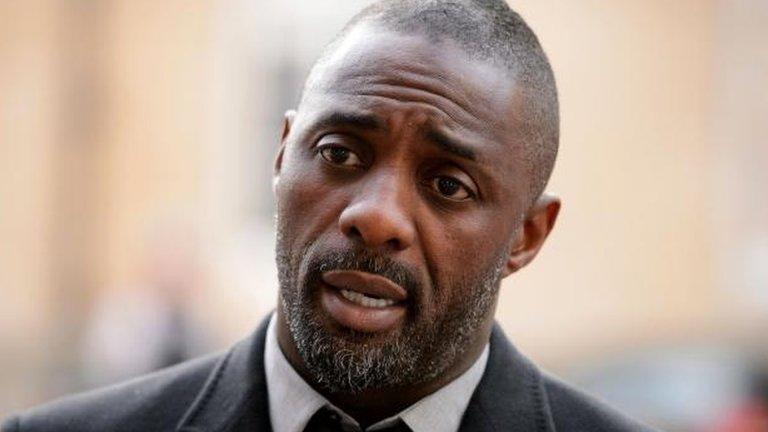
- Published1 September 2015
